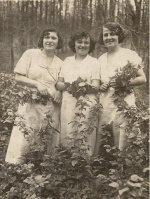Golda Moiseevna Smushkevich
Golda is the daughter of Moisei (Moisha) Aronovich Smushkevich.
The following is by Nelli Medvinsky, January 2005
Golda was fortunate enough to be born to kind and loving parents. Her parents named their baby girl Golda, which means “gold” in Yiddish. She was privileged to grow up in a big and friendly family. Unfortunately, she caught scarlet fever when she was a toddler, which left her deaf and mute. It was a difficult time to be a deaf mute. She was born in a Shtetl, and these small villages of Jews did not have special schools to make life easier. The accommodations of today were not available then.
At the age of 20, she moved with her parents to Kharkov, where she had the opportunity to study sign language. She began working as a seamstress at a clothing factory. There were other people who where deaf and mute working there and was a sign interpreter that helped them to communicate.
Golda was a pretty girl with a nice smile, brown hair and bright blue eyes. She was a very friendly person and made many friends working in the factory. She spent a lot of time with them. She even had a boyfriend. Unfortunately, she could not marry him because he was not Jewish.
Golda’s parents, brothers and sisters did not know sign language and she communicated with them by gestures. She could not express her love to them with words, but her family knew how much Golda loved them. She did not have her own children but she loved her nieces and nephews as if they were her own. When her brother Shaya’s wife, Riva, was pregnant, Golda touched her belly and gestured implying she will carry her brother’s child in her arms. She got along with all her siblings, particularly with Rakhil who was one year older. Rakhil was her sister as well as her best friend; they grew up together and found a way to communicate without words. Golda went to Rakhil with her girl secrets, which she could not share with her parents. Their little girl secrets have disappeared with them.
When World War II began, Golda did not evacuate from Kharkov. On December 16, 1941, she together with her parents, were forced to relocate to a ghetto. Miraculously, Golda managed to escape from the ghetto. She was hoping to find a jar filled with gold coins that her father, Moisha, had hidden the in brick stove when the war started. Her parents thought that these coins could help them and their daughter to survive in the ghetto. Of course, nothing could help them. Golda went to their old house, but could not find the coins. She spoke with their neighbors and then went to a girlfriend’s house. Her friend told Golda not to return to the ghetto. Worried about her parents, she took some food and went back. In January of 1942, Golda and her parents, along with over thirty thousand other Jews were killed by the Nazis and buried in a mass grave, a place now referred to as the Drobitsky Jar (on the outskirts of Kharkov).
Now, and all of her brothers and sisters have passed away, but Golda is still alive in the memories of her niece, Zelda Sorokina, and Riva, her brother Shaya’s wife.
